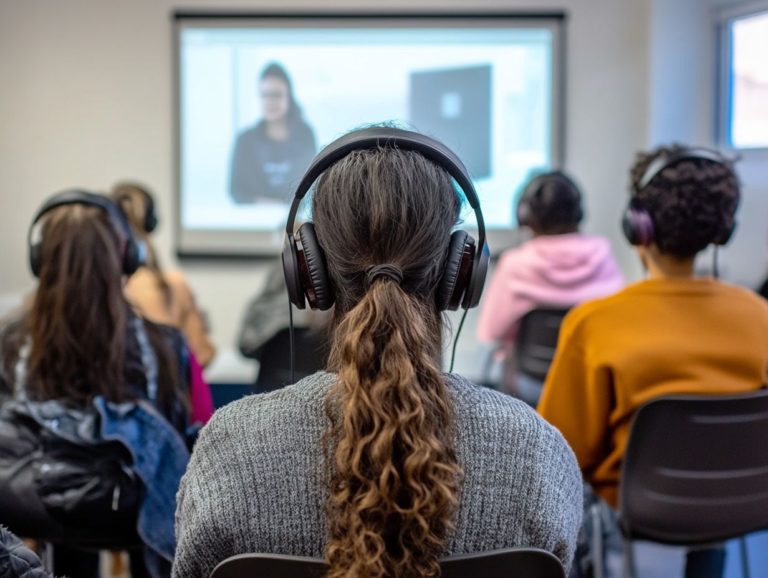why language courses matter in today’s global society
In today s interconnected world, mastering a new language transcends mere academic interest; it becomes an essential tool for your personal growth and professional advancement.
Language courses unlock doors to diverse cultures, sharpen your communication skills, and expand your career opportunities. While learning a new language may present challenges such as grammar intricacies and pronunciation hurdles these obstacles are part of an enriching journey.
Discover why language courses can dramatically change your life! This article highlights the myriad benefits they offer, common challenges you might encounter, and invaluable tips for selecting the right course and enhancing your learning experience.
Immerse yourself to discover how mastering a language can transform your life!
Contents
- Key Takeaways:
- The Importance of Language Courses
- Why Learning a New Language Matters
- Challenges of Learning a New Language
- How to Choose the Right Language Course
- Making the Most of Language Courses
- Frequently Asked Questions
- Why are language courses important for today’s global society?
- What skills can one learn from language courses?
- How do language courses benefit individuals personally?
- In what ways can language courses benefit businesses and organizations?
- Are language courses only beneficial for those who travel frequently?
- What makes language courses a valuable investment?
Key Takeaways:
Unlock your potential with language courses! They boost your career, enhance your thinking skills, and connect you to diverse cultures. Choosing the right language course and utilizing effective learning strategies can help you overcome challenges and maximize the benefits of language learning.
The Importance of Language Courses
Language courses are essential for elevating your language skills while reaping cognitive benefits that nurture personal growth.
Whether you want to learn a second language for academic success, career advancement, or cultural appreciation, these courses are invaluable tools for navigating the complexities of globalization and enhancing your empathy and communication skills.
Immersing yourself in language learning fosters community integration and deepens your understanding of diverse interests and experiences, which is vital in our interdependent society.
By engaging in these educational programs, you can break down language barriers and embrace the enriching life that bilingualism offers.
Understanding the Global Landscape
Understanding the global landscape is essential in today’s world. When you cultivate cultural awareness and communication skills, you open doors to enhanced international relations and foster empathy among individuals from diverse backgrounds.
As interactions across borders become more frequent, the importance of language learning comes into sharper focus. Each language carries its own cultural nuances, shaping how messages are crafted and perceived.
By embracing this diversity, you not only improve communication but also gain a deeper appreciation for varying perspectives. In our interconnected global society, misunderstandings can lead to conflicts, so honing your communication skills through language acquisition becomes an invaluable asset.
Ultimately, recognizing and respecting cultural differences enriches collaboration, promotes peace, and strengthens social bonds. In this context, empathy emerges as a vital ingredient for successful international engagement.
Why Learning a New Language Matters
Learning a new language provides you with a wealth of benefits that go well beyond simple communication. It sharpens your thinking skills, boosts your memory, and nurtures essential problem-solving skills needed to navigate modern life.
Furthermore, being bilingual opens a world of career opportunities, enhancing your marketability in an increasingly globalized job market. Acquiring a new language encourages lifelong learning and adaptability in our ever-evolving world.
Personal and Professional Advantages
The personal and professional benefits of learning a new language are remarkable. It enriches your life experiences and significantly boosts your career prospects in a competitive job market.
When you master a new language, you enhance your cognitive abilities, sharpening your critical thinking and problem-solving skills essential tools in today s fast-paced environment.
It also elevates your communication skills, enabling you to engage with diverse cultures and perspectives. As a result, you cultivate marketable skills that attract employers who value adaptability and global citizenship.
This opens up a world of career opportunities in fields like international relations, tourism, and translation. For those dedicated to lifelong learning, embracing a new language promotes continuous personal growth, cultural appreciation, and the ability to navigate our interconnected world with confidence.
Ready to change your life? Start learning today!
Challenges of Learning a New Language
Embarking on the journey of learning a new language can present a series of challenges. You may find yourself facing difficulty understanding the language and navigating common pitfalls that many learners encounter.
These hurdles can make it hard to think clearly and create obstacles in enhancing your memory and acquiring the language, making the entire experience feel overwhelming.
Common Difficulties and How to Overcome Them
Common challenges in language acquisition may include issues with grammar, vocabulary retention, and pronunciation. However, you can successfully navigate these obstacles by implementing effective strategies and creating a setting where the language is used all around you.
Beyond these hurdles, understanding cultural nuances and context is vital for effective communication. Consistent practice is essential to address these concerns.
Engaging regularly with native speakers through conversation exchanges or language apps can significantly enhance your understanding and fluency.
Consider adopting a language pledge method, where you commit to speaking solely in your target language for a designated period. This exciting approach can yield remarkable results, pushing you to step beyond your comfort zone and fostering adaptability and flexibility two essential traits for mastering a new language.
How to Choose the Right Language Course
Selecting the ideal language course is crucial for mastering a new language, as it profoundly influences your skill development and overall learning journey.
With many options available, including offerings from Middlebury Language Schools in languages such as Spanish, Arabic, and Russian, it’s vital to evaluate several key factors.
Consider the course structure, teaching methods, and how well the program can adapt to your unique learning style to ensure a fulfilling and effective experience.
Factors to Consider and Resources Available
- Course structure and teaching methods
- Quality of teaching by experienced instructors
- Access to a variety of materials from textbooks to digital resources
- Opportunities for community engagement through language exchange events
When selecting a language course, considering these factors is crucial. The quality of teaching plays a pivotal role in your learning outcomes. A great course taught by skilled teachers can immerse you in the language, significantly boosting your learning process.
Engaging with the community through local activities not only allows for practical application but also enriches your overall learning experience.
When all these elements come together, they can enhance cognitive benefits, making your chosen program both rewarding and impactful.
Making the Most of Language Courses
To truly maximize the benefits of language courses, embrace effective learning techniques that enhance retention.
Seek out immersive environments that boost your communication skills and foster a commitment to lifelong learning.
Tips for Effective Learning and Retention
Effective learning and retention in language courses can be elevated through various strategies. Create an immersive environment where the language surrounds you, practice your communication skills regularly, and employ cognitive techniques designed for language acquisition.
Incorporate spaced repetition into your study regimen. This method allows you to revisit material at strategically timed intervals to enhance memory retention.
Engaging in interactive practice, such as participating in language exchanges or joining conversation clubs, reinforces what you’ve learned by allowing you to apply new vocabulary and grammar in real-life situations.
Getting involved with a community through online forums or local meetups offers valuable support and boosts your motivation and accountability.
By focusing on these techniques, you can enhance your thinking skills and cultivate a lifelong passion for mastering new languages.
Frequently Asked Questions
Q: What is the best way to start learning a new language?
A: Start by immersing yourself in the language through apps, videos, and conversation exchanges. Set clear goals and practice regularly.
Q: How much time should I dedicate to language learning each week?
A: Aim for at least 30 minutes of practice each day. Consistency is key to progress.
Q: Do I need to learn grammar rules before speaking?
A: It’s helpful to know some basic grammar, but focus on speaking and understanding first. You can refine your grammar as you go.
Why are language courses important for today’s global society?
Language courses are essential in our global society. They help people communicate with different cultures and build strong connections.
What skills can one learn from language courses?
Language courses teach speaking, reading, and writing skills. They also develop thinking skills and cultural awareness, which are valuable in the job market.
How do language courses benefit individuals personally?
Language courses improve memory and thinking skills. They also boost self-confidence and expand your worldview.
In what ways can language courses benefit businesses and organizations?
Language courses allow businesses to communicate with a wider customer base. This helps reach new markets and strengthens relationships with international partners.
Are language courses only beneficial for those who travel frequently?
No, language courses are beneficial for anyone in today’s global society. Knowing a second language can enhance everyday interactions and career opportunities.
What makes language courses a valuable investment?
Language skills unlock amazing job opportunities and boost your earning potential! Invest in your future through language courses today.



